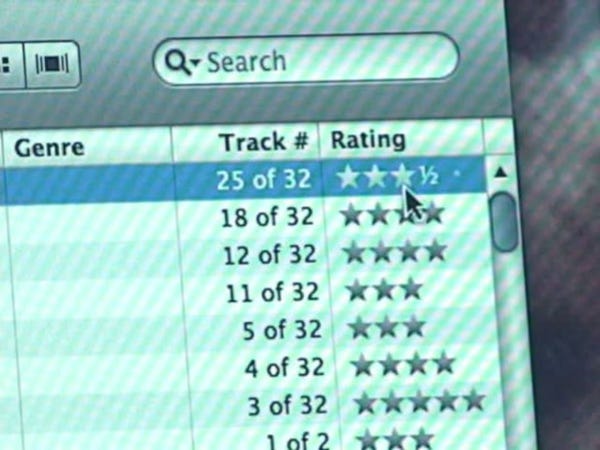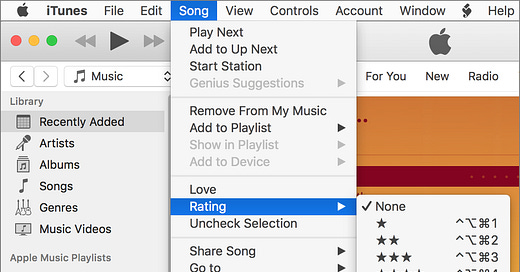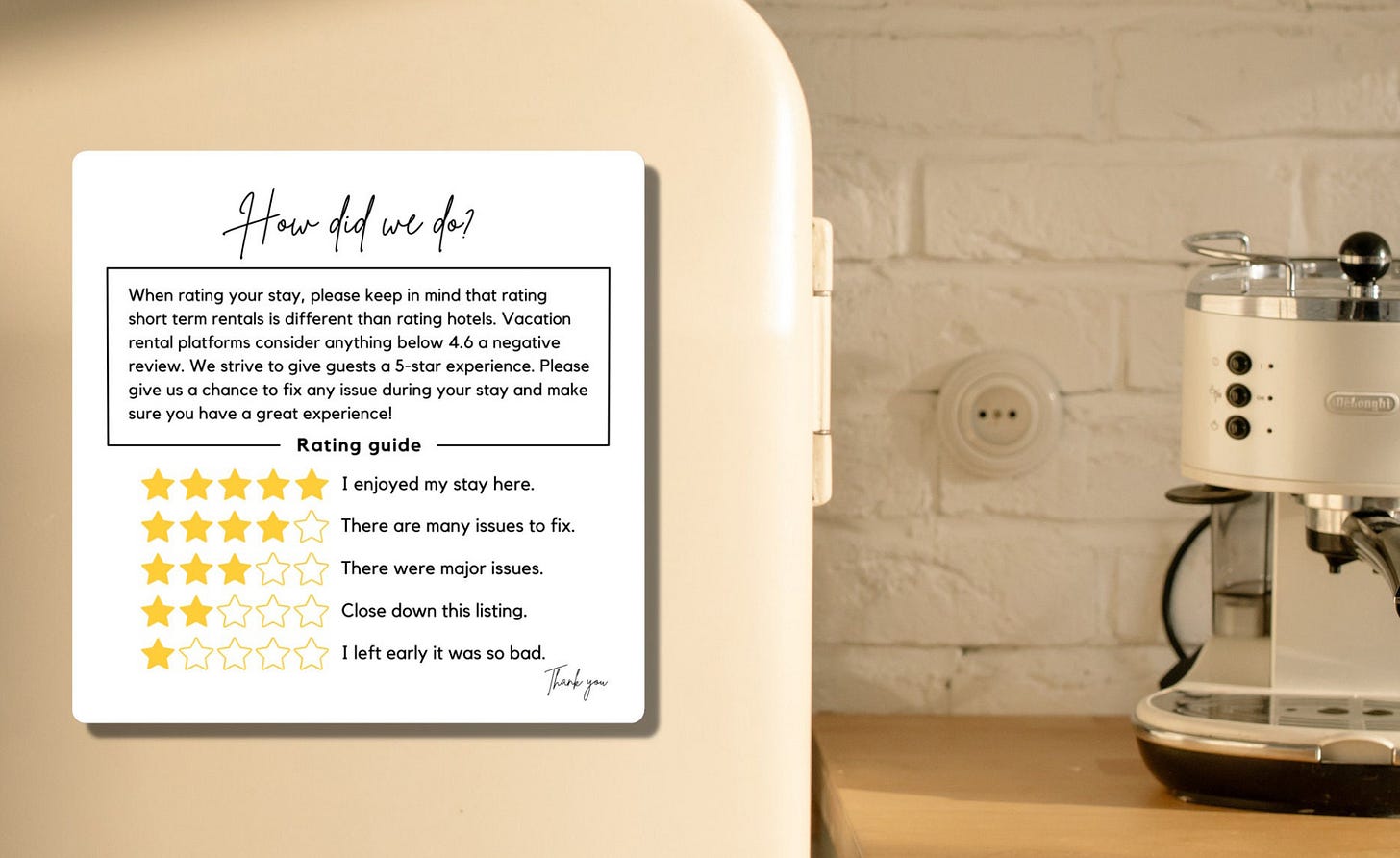Revolutionizing Feedback: The iTunes Legacy and the invention of Qualitative Star Ratings
Beyond Michelin and Hilton: Rethinking Broken Ratings Systems


The introduction of the five-star rating system by iTunes in 2003 marked a pivotal moment in the evolution of user-generated feedback mechanisms, fundamentally altering how ratings systems would be designed and utilized across a myriad of platforms and industries. This move did not merely introduce a new feature; it showcased a model that effectively harnessed the collective voice of users, setting a benchmark for transparency, user engagement, and reliability in feedback systems. Unlike previous systems, which often struggled with issues of subjectivity, manipulation, or lack of user relevance, iTunes demonstrated a successful approach to gathering and utilizing user feedback.
Before the advent of iTunes' rating system, many industries relied on expert opinions or overly simplistic user feedback mechanisms that did not capture the nuances of a persons experience. The Michelin Guide's star system, while prestigious, has been criticized for its opacity and the subjective discretion of its inspectors. Similarly, the automotive industry's smog check star ratings offered limited insight into the overall environmental performance of vehicles, often failing to account for real-world usage variations. In the hospitality sector, hotel star ratings, such as those used by Hilton and others, were frequently criticized for their lack of consistency and transparency, with standards varying significantly from one country to another and often serving more as marketing tools than genuine indicators of quality or service.

The Flaws in Preceding Systems
Automotive Smog Check Programs: Some regions implement star rating systems to categorize vehicles based on their emissions performance. However, this approach has faced scrutiny over its simplicity and potential to mislead consumers. The star ratings might not fully reflect a vehicle's overall environmental impact, considering factors like fuel efficiency and manufacturing processes.
Hotel Star Ratings (e.g., Hilton and other chains): The hotel industry's star rating system, including those used by chains like Hilton, has been criticized for lacking a global standardization. Different countries and organizations may have varying criteria for what constitutes a one-star versus a five-star hotel, leading to confusion among travelers. Moreover, some argue that these ratings have become more of marketing tools rather than objective assessments of quality and amenities.
Healthcare Facility Ratings: Various organizations and governments attempt to rate healthcare facilities using star systems, intending to guide patients in choosing high-quality care providers. However, these ratings can be challenging to interpret and may not capture the nuances of patient care quality. Factors such as patient outcomes, staff ratios, and patient satisfaction are difficult to distill into a simple star rating, potentially oversimplifying complex issues.
Educational Institution Rankings: Although not always presented as "star ratings," the concept of ranking educational institutions has parallels to the challenges faced by other rating systems. These rankings can be overly simplistic and fail to account for the diverse strengths and weaknesses of different institutions. They often emphasize certain metrics, like test scores or graduation rates, without capturing the full educational experience.
Consumer Electronics Certifications (e.g., Energy Star): While not a direct criticism of the Energy Star program itself, which rates products based on their energy efficiency, there have been instances where the certification process was manipulated, or products did not maintain their efficiency over time. This has led to questions about the consistency and reliability of such ratings.
Airline Quality Ratings: Various organizations rate airlines using star systems, but these ratings can be subjective and vary widely depending on the criteria used. Aspects like comfort, service, and reliability are challenging to quantify, leading to discrepancies between different rating systems and potential confusion for travelers.
Michelin Star System for Restaurants: While the Michelin Guide is highly respected, its star rating system has been criticized for opacity and subjectivity. Restaurants often find the criteria for earning stars to be unclear, and there have been claims of inconsistency and bias in the selection process. Additionally, the pressure to maintain or achieve stars can significantly influence a restaurant's operations and menu choices.
The Ripple Effect on Digital Services
The success of iTunes' rating system demonstrated the potential for user ratings to transform service industries beyond music. Yelp, which emerged as a powerhouse in business reviews, leveraged a similar model, allowing customers to rate their experiences with local businesses. This provided invaluable insights for both consumers and businesses alike, fostering improvement and accountability.
Similarly, Airbnb utilized user ratings to build trust and transparency in its home-sharing platform. By allowing hosts and guests to rate each other, Airbnb created a self-regulating community where the quality of accommodations and the behavior of guests became transparent.
Uber's adoption of a two-way rating system for both drivers and riders further exemplified the versatility and importance of on-the-fly star ratings in service-oriented platforms. This real-time feedback mechanism helped maintain high service standards and safety, enhancing the overall user experience.
Prior to the iTunes Music Store launch in April 2003, specific services and platforms experimented with rating systems that encountered various issues, but identifying exact platforms that failed exclusively due to their rating systems before this time frame is challenging, as comprehensive records and analyses are sparse. We can reference some well-known services and initiatives around or before the early 2000s that faced criticisms or had notable limitations with their rating or feedback mechanisms.
eBay: Launched in 1995, eBay's feedback system, integral to its user trust mechanism, often received criticism for allowing retaliatory feedback and the pressure it placed on both buyers and sellers to leave positive reviews to maintain good standing, regardless of the actual transaction quality.
Amazon.com: Since the mid-1990s, Amazon has used customer reviews to rate products. However, the platform has struggled with fake reviews and biased ratings, where sellers would manipulate their product ratings through paid reviews or other tactics to boost their visibility and sales.
Yahoo! Auctions: Competing with eBay, Yahoo! Auctions was another early online auction site that implemented a user rating system. Similar to eBay, it faced challenges with trust and the reliability of user feedback, contributing to its struggles to dominate over eBay in various markets.
CNET: As an early technology review and news site, CNET allowed users to rate products. However, the aggregation of user ratings often didn't align with expert reviews, leading to confusion and questioning the reliability of user-generated scores.
Epinions.com: Founded in 1999, Epinions was one of the first websites to allow users to write reviews and rate products ranging from electronics to cars. While innovative, Epinions faced challenges in ensuring the authenticity of reviews and struggled with the issue of compensating users for their contributions, which sometimes led to questions about the integrity of its rating system.
IMDb: The Internet Movie Database allowed users to rate movies and TV shows, but its open rating system led to concerns over vote stuffing and the representation of ratings.
Slashdot: Known for its "Slashdot effect," its user moderation system faced challenges in ensuring fair and unbiased moderation of comments, leading to discussions about the echo chamber effect and moderator bias.
CNET: CNET's early user review sections for tech products encountered issues with reliability and the potential for manipulated reviews, similar to other early online review platforms.
TripAdvisor: Although TripAdvisor became more prominent after 2003, its early attempts at collecting travel reviews and ratings faced hurdles in ensuring authenticity and combating fake reviews.
Airbnb Challenges the Traditional Hotel Rating System
Airbnb's introduction of a user-engagement-based rating system significantly exposed the limitations and marketing manipulations inherent within the traditional hotel star rating system. Before platforms like Airbnb revolutionized the lodging industry, hotel ratings were often criticized for their lack of transparency and consistency, with allegations that some establishments inflated their star ratings for marketing purposes. Unlike these subjective and sometimes misleading classifications, Airbnb's model empowered actual guests to share their experiences through detailed reviews and ratings. This direct feedback mechanism provided a more accurate, transparent, and democratic view of accommodation quality, starkly contrasting with the opaque criteria and potential for embellishment found in the conventional hotel star system. Airbnb's approach not only offered prospective guests insights into the true quality of their stays but also pressured the hospitality industry to adopt more honest and customer-focused practices, highlighting the power of genuine user engagement in unveiling and correcting marketing distortions.
Healthgrades' Strategic Acquisition by Red Ventures
Healthgrades.com, renowned for its innovative use of five-star ratings to evaluate doctors and medical institutions, has recently been acquired by Red Ventures, a move that underscores the growing importance of transparent, user-generated feedback in the healthcare industry. This acquisition highlights the compelling value of Healthgrades' platform, which has successfully translated the familiar five-star rating system into a robust tool for assessing medical care quality. By allowing patients to rate their experiences with healthcare providers, Healthgrades has not only empowered consumers to make informed decisions but also incentivized healthcare providers to maintain high standards of care. Red Ventures' acquisition of Healthgrades signifies a strategic expansion into the healthcare sector, leveraging the platform's established credibility and extensive database to enhance patient engagement and trust in healthcare services
Yelp: Navigating Challenges in the Feedback Landscape
Yelp has remained a steady climber on the stock market, affirming its position as the go-to platform for ratings based on actual user feedback. Despite facing uphill challenges, including threats from activists using negative reviews to target businesses with opposing value systems, Yelp has navigated these complex waters with strategic policies and community engagement efforts. The platform's commitment to authentic and unbiased user-generated content has solidified its reputation among consumers seeking trustworthy reviews. Yelp's resilience and adaptability in addressing these challenges have contributed to its sustained growth, highlighting the critical role of transparent feedback mechanisms in today's digital marketplace.
Legacy and Future Directions
iTunes' pioneering use of the five-star rating system laid the groundwork for a new era of digital feedback mechanisms. By proving the effectiveness of user-generated ratings, it paved the way for numerous digital services to incorporate similar features, enhancing transparency, accountability, and user engagement across sectors. Today, the concept of star ratings continues to evolve, incorporating more nuanced feedback mechanisms and algorithms to refine the accuracy and usefulness of user feedback.
As digital platforms evolve, the legacy of iTunes' star rating system endures, reminding us of the power of democratized feedback in shaping the digital marketplace. This approach to ratings has not only improved the quality and reliability of digital services but has also empowered users, making their voices an integral part of the digital ecosystem.
The introduction of the five-star rating system by iTunes not only revolutionized the way users interact with digital content but also set new standards for the design and implementation of feedback mechanisms across industries. By prioritizing user engagement, transparency, and a constructive feedback loop, iTunes' approach has paved the way for more sophisticated, reliable, and user-focused rating systems, fundamentally changing how consumer feedback influences the digital and physical marketplace.













